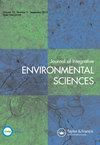An assessment of Swaziland sugarcane farmer associations’ vulnerability to climate change
IF 3.5
4区 环境科学与生态学
Q3 ENVIRONMENTAL SCIENCES
Journal of Integrative Environmental Sciences
Pub Date : 2017-01-01
DOI:10.1080/1943815X.2017.1335329
引用次数: 14
Abstract
Abstract The study investigated the vulnerability of Swaziland’s sugarcane small scale farmer associations (SSFAs) to climate change through the Sustainable Livelihoods Framework. From a survey of 45 SSFAs, representing +2700 farmers, drought emerged as the most significant stress. Droughts result in failed cane germination, increased pests and increased diseases. Farmers indicated that there had no land title deeds and were concerned about the poor state of infield and feeder roads damaged during heavy rainfall and floods. It emerged that the bulk of the SSFAs irrigate during the day, a scenario that leaves them vulnerable to high temperatures leading to high evapotranspiration. In addition, 97% of the SSFAs sampled did not have drought preparedness plans and likewise, all did not have a flood management plan. About 76% of SSFAs operation costs goes to crop upkeep and harvesting, with labour cost increases attributed to extreme weather events. All sampled SSFAs had no insurance against loss from extreme weather events. Given the foregone, the paper recommends that the government fast tracks the 1999 Draft Land Policy intended to address the issue of title deeds. The paper further suggest that extension officers and farmers be trained to sharpen skills on understanding climate change.对斯威士兰甘蔗农民协会对气候变化脆弱性的评估
本研究通过可持续生计框架调查了斯威士兰甘蔗小规模农民协会(SSFAs)对气候变化的脆弱性。根据对45个ssfa(代表2700名农民)的调查,干旱是最严重的压力。干旱导致甘蔗发芽失败,病虫害增加。农民们表示,他们没有地契,并担心内场和支线公路在暴雨和洪水中受损。结果显示,大部分ssfa在白天灌溉,这种情况使它们容易受到高温的影响,从而导致高蒸发蒸腾。此外,97%的抽样地区没有干旱防范计划,同样,所有地区都没有洪水管理计划。大约76%的ssfa运营成本用于作物维护和收获,极端天气事件导致劳动力成本增加。所有取样的ssfa都没有对极端天气事件造成的损失进行保险。鉴于上述情况,文件建议政府尽快跟进一九九九年土地政策拟稿,以处理业权契据问题。这篇论文进一步建议对推广官员和农民进行培训,提高他们了解气候变化的技能。
本文章由计算机程序翻译,如有差异,请以英文原文为准。
求助全文
约1分钟内获得全文
求助全文
来源期刊

Journal of Integrative Environmental Sciences
ENVIRONMENTAL SCIENCES-
CiteScore
3.90
自引率
0.00%
发文量
13
审稿时长
>12 weeks
期刊介绍:
Journal of Integrative Environmental Sciences (JIES) provides a stimulating, informative and critical forum for intellectual debate on significant environmental issues. It brings together perspectives from a wide range of disciplines and methodologies in both the social and natural sciences in an effort to develop integrative knowledge about the processes responsible for environmental change. The Journal is especially concerned with the relationships between science, society and policy and one of its key aims is to advance understanding of the theory and practice of sustainable development.
 求助内容:
求助内容: 应助结果提醒方式:
应助结果提醒方式:


